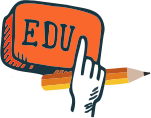
In conclusion, it seems that as a nation, we need to rethink and reimagine where and how the public learns science. It suggests the significance of taking a comprehensive, ecosystem-extensive method that locations equal value on non-school assets. America ought to be striving to attach science learning experiences throughout the day and over a lifetime.
Attending a program out of state, for instance, can double your annual tuition costs. Some schools charge larger tuition for half-time enrollment, and on-line programs usually require further technology fees.
Instructional Coordinator Instructional coordinators direct group and implementation of a faculty, district, or state curriculum. They may work with elementary or secondary colleges, schools, or other academic organizations.
A Master of Science in Education provides students with profession alternatives inside and outside the classroom. Possible profession paths embrace instruction, curriculum, leadership and particular education. This degree focuses on sensible, hands-on experiences that allow the student to evaluate schooling practices and create feasible solutions and strategies. Students will study superior instructional theories, perform in-depth analysis and explore academic psychology.
Curriculum
Merredith Portsmore, director of the Center for Engineering Education and Outreach at Tufts University in Massachusetts, says that educators from around the globe have enquired concerning the US method. Improving outcomes, says Peter McLaren, govt director of the non-profit initiative Next Gen Education, would require a shift within the classroom from a instructor-centred approach to at least one that helps students work via ideas themselves. McLaren, who helped to write the Next Generation Science Standards, used to show common science in East Greenwich, Rhode Island, and remembers a lesson he once taught on gases. He had borrowed his ex-spouse’s fragrance bottle and sprayed it around the front of the classroom. ”œI asked the students to lift their hands when they may scent something,” he recounts.
The science part of a liberal-arts training is essential for giving college students the power to interact with and perceive the actual that means and limitations of quantitative information. This is obviously crucial for evaluation, nevertheless it’s equally essential as a tool for advocacy, helping persuade others to hitch in action to make the world a better place. For each complex drawback there’s a chic but brutally reductive resolution that can make everyone sad– we want students to have the knowledge to avoid these and chart a better course. That stated, a liberal-arts training necessarily includes studies outdoors of science because the important context of a complicated state of affairs will often embody elements from a wide range of human experiences. Understanding an actual-world state of affairs requires some stage of consolation with issues of historical past and culture, and empathy for others.

